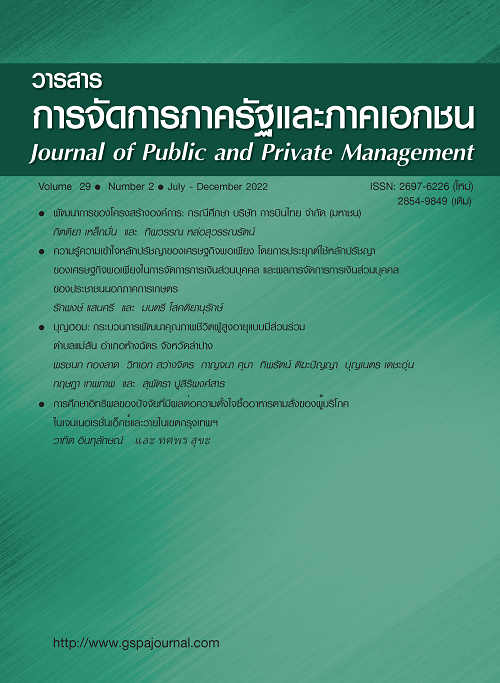Boonhom: Process for Improving the Quality of Life of the Elderly with Participation in Maesan Subdistrict, Hangchat District, Lampang Province
Keywords:
Process of improving elderly quality of life, Boonhom elder school, learning process, self-essemAbstract
This study is a participatory action research which aim to create a learning process for improving elderly quality of life in terms of self-esteem as well as to establish a learning centre for improving elderly quality of life. Participant were 90 elderly persons of Maesan sub-district Administration. Observation of group discussion, in-depth interviews and brainstorming sessions were applied. Data were analyzed using triangulation. The results revealed that a driving force of Boonhom elderly school, regarding to glorifying elderly as a precursor who emphasizing love in merit, fun and cheerfulness and having a good friendship were a main point to improving elderly quality of life. Up to date, Boonhom elderly school becomes Boonhom family according to providing teaching status to elderly to teach each other through their experiences by circulation in a specific group and a clearly role play as students and teachers. Academic content has been transformed into an informal as a story which is fun and free for expressing their own values and ideas. This learning process creates a local teacher who is an identity of improving elderly quality of life in Boonhom family and being a base line for a community development which emphasize on community culture.
References
Chunhassarami, S. (2012). Integrated Care for the Elderly in the Community. ASEAN Institute for Public Health Development Mahidol University. Retrieved August 15, 2018 from http://www.thaiichr.org/upload/forum/ElderlyCare.pdf.
Damrikarnlert, L. (2012). Situation of Needs for Elderly Care in the Community. ASEAN Institute for Public Health Development Mahidol University. Retrieved August 15, 2018 from http://www.thaiichr.org/upload/forum/ElderlyCare.pdf.
Dormann, C., Fay, D., Zapf, D., & Frese, M. (2006). A state-trait analysis of job satisfaction: On the effect of core self-evaluations. Applied Psychology: International Review, 55(1), 27-51.
Dudsdeemaytha, J., Noklang, S., Chanfong, N., & Soonthronchai, S. (2015). The development of happiness model in older adults via Siam laughter therapy through community-based participatory action research: A case study of Baan Tachang community, Wattananakorn district, Srakaew province. Area Based Development Research Journal, 7(1), 31-46.
Katz, D., & Kahn, R. L. (1966). The Social Psychology of Organizations. New York: Wiley.
Kunset, P., & Jeraprapat, U. (2019). Community-based healthy promotion model of Ban Bo Lo, Nakhon Si Thammarat province. Area Based Development Research Journal, 11(1), 78-92.
Maesan Subdistrict Administration Organization, Hang Chat District, Lampang Province. (2018) . Vision of Maesan Subdistrict Administrative Organization. Retrieved August 20, 2019 from http://www.
maesan.go.th/project_detail.php?hd=26&id=180.
Phalasuek , R., & Thanomchayathawatch, B. (2017). A family model for older people care. The Southern College Network Journal of Nursing and Public Health, 4(3), 135-150.
Petsirasan, R., Noonil, N., Aekwarangkoon, S., Rithiral, R., Sitipong P., & Sanpakdee, T. (2018). The development of potential of district health network for elderly care system: A case study of Takheun subdistrict, Thasala district, Nakhon Si Thammarat province. Area Based Development Research Journal, 10(6), 484-495.
Sangthong, J. (2017). Aging society (complete aged): The elder condition of good quality. Area Based Development Research Journal, 38(1), 6-28.
Schimmack, U., & Diener, E. (2003). Predictive validity of explicit and implicit self-esteem for subjective well-being. Journal of Research in Personality, 37(2), 100-106.
Sindecharak, T. (2017). Elderly in Chinese Society: Welfare Arrangements Care Master and Social Activities. Retrieved March 4, 2019 from http://www.kmutt.ac.th/jif/public_html/Download/
Format_Checker/2/14.pdf.
Sudsomboon, S., Thammaporn, W., Puttasukkee, T., & Chaimay, P. (2016). Role of local government organization for elderly care. Journal of Southern Technology, 9(1), 121-128.
Wasi , P. (2012). Integrated Care for the Elderly in the Community. ASEAN Institute for Public Health Development Mahidol University. Retrieved August 20, 2018 from http://www.thaiichr.org/upload/forum/ Elderly Care.pdf.
Watcharakajonkun, N. (2012). Lessons on How to Manage Coordination Parties in Integrated Care for the Elderly. ASEAN Institute for Public Health Development Mahidol University. Retrieved September 20, 2018 from http://www.thaiichr.org/upload/forum/ElderlyCare.pdf.
Wongcharoen, T. (2018). Learning Designer: New Dimension Bangkok University for Education Reform, Receive the Trend of Education Disruption. Retrieved September 22, 2018 from https://www.thairath.co.th/content/1259657.
World Health Organization. (1986). Ottawa Charter for Health Promotion. World Health Organization, Canadian Public Health Association. Ontario: World Health Organization.
Downloads
Published
How to Cite
Issue
Section
License

This work is licensed under a Creative Commons Attribution-NonCommercial-NoDerivatives 4.0 International License.



